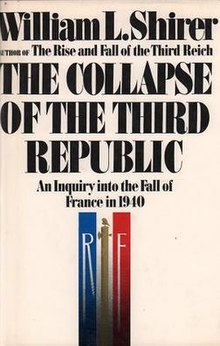The Collapse of the Third Republic

Cover of the first edition
|
|
| Author | William Shirer |
|---|---|
| Country | United States |
| Language | English |
| Publisher | Simon & Schuster |
|
Publication date
|
1969 |
| Media type | |
| Pages | 1082 |
| ISBN | |
The Collapse of the Third Republic: An Inquiry into the Fall of France in 1940 by William L. Shirer (New York: Simon & Schuster, 1969) deals with the collapse of the French Third Republic as a result of Hitler's invasion during World War II.
As a CBS correspondent in Germany during the climactic event under discussion, and as a frequent visitor to and correspondent from France during the prewar years, Shirer was left to question how Germany had overrun France within weeks in 1940. These two countries had fought each other for four years in 1914-1918, with France successfully resisting Germany at every turn of battle along the Western Front during World War I.
Shirer, who knew French, did much of his own research for this 1969 book by talking with surviving politicians and French leaders from the immediate prewar period as well as those who were on duty during the final catastrophe. His conclusion was that France had defeated itself. Unhealed wounds in its civil society, dating back to the Dreyfus Affair of the 1890s, had left France's political left and right with unassuageable feelings of resentment towards their opponents.
The Great Depression of the 1930s further inflamed these feelings of bitterness. The Right, in particular, believed that its country's secular leadership was condemning the country to decadence. A badly-divided France tried to avoid war with Adolf Hitler, participating fully in the negotiations at Munich in 1938, but Hitler forced the issue in the following year with his invasion of Poland. World War II had begun.
In 1939 and 1940, the République française (French Republic) faced a united, determined, and technologically sophisticated enemy. It was desperately important for France to match the enemy's traits with determination and unity of its own. Instead, French national leaders frittered away their final months before the catastrophe in a round of internal hostility, intrigue, and backbiting, leading to the restoration of World War I hero Marshal Philippe Pétain as Premier.
...
Wikipedia
